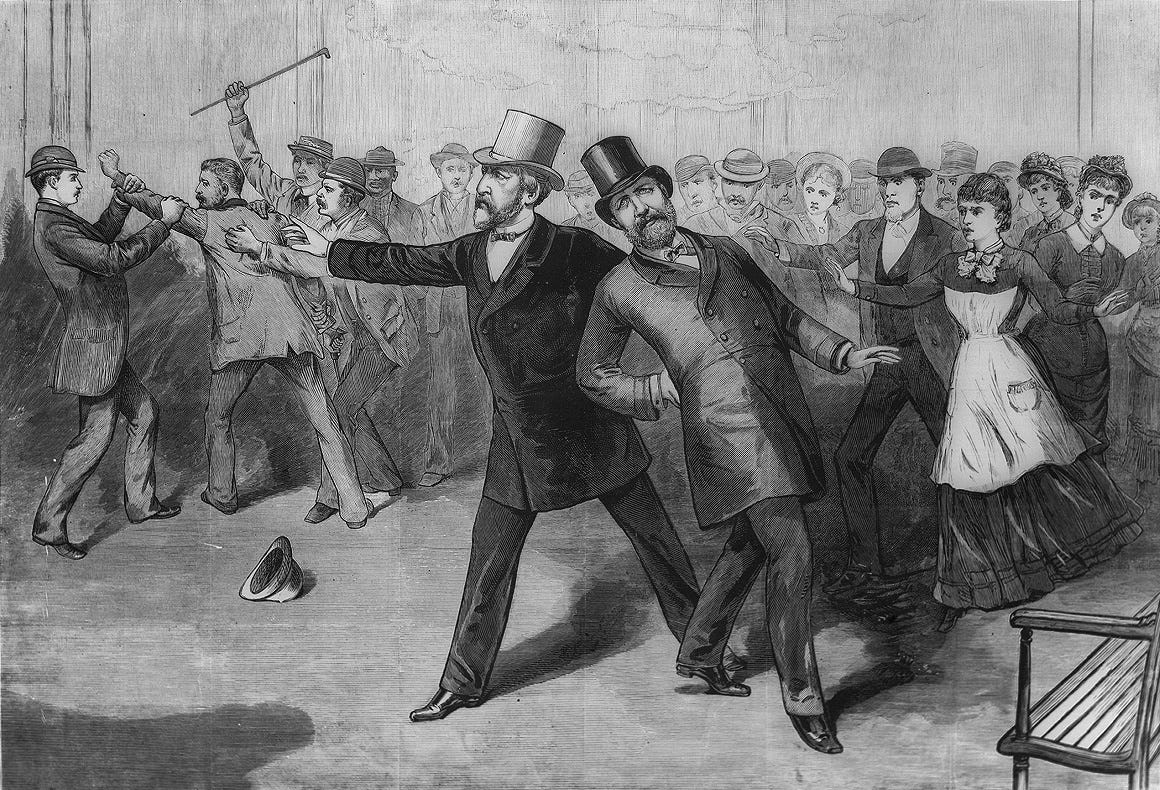TDIH: James Garfield's assassination
Would you believe that Guiteau shot the President simply because he’d been denied a job in the Garfield administration?
On this day in 1881, Chester Arthur is sworn in as the 21st President of the United States. His predecessor, James Garfield, had passed away just one day earlier. The deceased President had been struggling for weeks to heal after an assassin’s attack.
The assassin’s name was Charles J. Guiteau. Would you believe that Guiteau shot the President simply because he’d been denied a job in the Garfield administration?
Guiteau was a seedy character, to say the least. He had a long history of running away from bill collectors. Sometimes he pretended to be a minister so he could hitch a free ride on a train. He beat his wife and was purposefully unfaithful so she would have grounds for a divorce. At one point, his behavior became so erratic that his sister wanted him committed.
During the 1880 presidential election, Guiteau became obsessed with politics. He was certain that Garfield needed his help. He’d written a speech and felt certain that it would swing the election for Garfield if he were only allowed to deliver it.
Guiteau attended Republican events and gave copies of his speech to every Republican official that he met. He lobbied for a chance to give the speech. He was finally given an opportunity to deliver it to a small crowd, but he got so flustered that he didn’t complete the speech. Nevertheless, when Garfield was elected, Guiteau was convinced that he’d been critical to the new President’s success. Surely he deserved a post in the Garfield administration?
He wanted to be a minister to Austria, or perhaps a consul to Paris.
Garfield’s people tried to decline politely, but Guiteau wouldn’t take no for an answer. By early June 1881, he’d made such a nuisance of himself that he was barred from entering the White House.
Guiteau decided that the Garfield administration was destroying the country. He felt that he had divine sanction to kill the President. People would be mad at first, he reasoned, but then they would come to see him as a hero.
Guiteau followed the President for weeks. Presidents didn’t then have bodyguards, so Garfield would make an easy target. On July 2, Garfield was at a train station, preparing to depart for a vacation. Guiteau stepped out from the shadows and fired two shots at the President. Chaos broke out, but a police officer was able to seize Guiteau and arrest him. After a few minutes, some doctors arrived to tend to Garfield. He was moved to a room on the second floor of the train station.
In the end, at least twelve different doctors spent time probing in Garfield’s body with unclean hands and unsterilized equipment. They never found the bullet, even after he was taken back to the White House and a (then new) metal-detecting machine was tried.
Garfield lingered for weeks. His doctors constantly probed him, never taking care to sterilize anything. At one point, he was refused solid food because the doctors thought it might hurt him.
He lost nearly 100 pounds.
The President finally passed away on September 19. After his death, an autopsy showed that the bullet had lodged in the left side of his back. His vertebra had been pierced, but his spinal cord was untouched. His wound would have been considered nonlethal and easily treated today.
Guiteau was hanged on June 30, 1882, almost one full year after he’d shot Garfield. Before his death, Guiteau confirmed: “I shot at him twice....” And yet he also stated: “The doctors killed him; I did not kill him.”
Hmmm. Maybe so. How tragic.
Sources can always be found on my website, here.



The art and science of the medical field was certainly more art than science in the early 1880s. In another hundred years, the same will probably be said about the state of medicine in the 2000s. We have come a long way in our understanding of sterilization and our technology is much advanced from the 1880s.
It is a shame that President Garfield was assassinated and common sense from our common knowledge wouldn't allow anyone, let alone a President, be treated as Garfield was at that time.
Thank you Tara.
Garfield's assassination is rarely taught in schools anymore. Abraham Lincoln was the first president to be assassinated in 1865 but by 1901 two other presidents would join him (Garfield and McKinley). Definitely a tumultuous period of time in our nation's history.